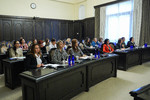Friday, 28 October 2022
Deputy Prime Minister Matevosyan chairs the session of the Council on Women's Affairs in the Republic of Armenia
Chaired by Deputy Prime Minister Hamardzum Matevosyan, the session of the Council on Women's Affairs in the Republic of Armenia was held today, attended by both the members of the Council, and our international partners and representatives of non-governmental organizations.
Welcoming the participants of the session, the Deputy Prime Minister emphasized the importance of the Council, which is designed to support the equal involvement of women and men in the public, social, economic and political platforms of the country, strengthening the equal rights and opportunities of women and men, and ensuring a non-discriminatory and safe environment for every citizen.
The issues on the agenda included measures aimed at increasing the involvement of women at all levels of STEM-oriented higher education, measures and proposals promoting the involvement of women in the IT sector, issues of full and substantive involvement of women in the Armed Forces of Armenia, and other related issues.
Responding to the issues under discussion, the Deputy Prime Minister noted that through continuous education and a constructive and targeted approach, we should step by step approach the realization of the Council's main goals and form such a dialogue between the state and the society where ensuring gender equality will become a usual process in our country, with flexibility in overcoming obstacles.
Adhering to the principles of the strategy for the implementation of gender policy in the Republic of Armenia, Hambardzum Matevosyan stressed that in order to promote gender equality in all fields, an effective mechanism should be created and introduced, which will ensure the raising of awareness among the public of programs implemented with state support and in cooperation with international organizations, while participating in the activities carried out in this direction will become a systematic and targeted process, which will help us, evaluating the existing statistics, to make the programs more targeted and to be more targeted in setting future priorities.









